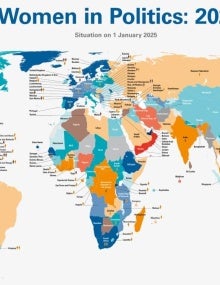21 - 31 of 31 Results
Pagination
Date:
With thanks to the Government of Japan, who generously funded the regional ‘Women's Leadership, Empowerment, Access, and Protection (LEAP) project as well as the resilience monitoring efforts in 2020 and 2020, UN Women in Yemen was able to roll-out the gender-sensitive resilience capacity index in Al Hodaidah, Aden and Hadramout through its implementing partners, the Yemeni Women Union (YWU), Women Charity Association for Combating Poverty (WACP) and Youth Leadership Development Institute (YLDF).
Date:
The analysis included in this report builds upon data collected through the LEAP project and sought to provide evidence around key resilience issues.
Date:
This brief shines a light on the critical role of women’s leadership in responding to COVID-19 and preparing for a more equitable recovery. Across the globe, women are at the helm of institutions carrying out effective and inclusive COVID-19 responses, from the highest levels of decision-making to frontline service delivery.
Date:
This year’s regular resources report analyses how UN Women mobilized its core contributions in 2019 to fulfil its normative, coordination, and operational activities mandate, in order to improve the lives of women and girls worldwide. Through the presentation of tangible results, this report presents case studies at the global, regional, and country levels to showcase the impact that regular resources have in the countries where UN Women is present.
Date:
In late 2018 and early 2019 UN Women interviewed 87 per cent of the women who ran for Parliamentary election (75 of the 86 women; of the 113 women who registered to run, 86 made it on to candidate lists).This report summarizes their stories and experiences as candidates.
Date:
Lebanon National Action Plan on United Nations Security Council Resolution 1325 (2019-2022)
Date:
Supported by photos, data, infographics, and individual stories of impact, UN Women's Fund for Gender Equality (FGE) annual report presents main aggregated results achieved by its 25 active projects. It highlights the process and outcomes of its fourth grant-making cycle, 2018–2019, a scaling and innovation initiative. The report also features FGE’s South-South and triangular cooperation strategy, a few impact news from past projects, and two grantee partners’ op-eds.
Date:
Globally, more than 2.5 billion women and girls are affected by discriminatory laws and the lack of legal protections. This policy strategy seeks to fast track the repeal of discriminatory laws in 100 countries between 2019 and 2023, focusing on six thematic areas, and will address the legal needs of more than 50 million women and girls.
Date:
Globally, more than 2.5 billion women and girls are affected by discriminatory laws and the lack of legal protections. This policy strategy seeks to fast track the repeal of discriminatory laws in 100 countries between 2019 and 2023, focusing on six thematic areas, and will address the legal needs of more than 50 million women and girls.
Date:
The ‘Year of Egyptian Women’ has opened a historical window of opportunity for the advancement of gender equality and women’s empowerment (GEWE) in Egypt. The launch of the National Women’s Empowerment Strategy (2017-2030) has firmed the political commitment towards realizing women’s political, economic and social rights as granted by the Constitution. The ambitious goals and targets do not only place women’s empowerment as a prerequisite for achieving gender...
Date:
The Beijing Declaration and Platform for Action calls on Governments, the international community and civil society, including NGOs and the private sector, to take strategic action in the following 12 critical areas of concern: poverty, education and training, health, violence, armed conflict, the economy, power and decision-making, institutional mechanisms for the advancement of women, human rights, media, the environment, and the girl child.










